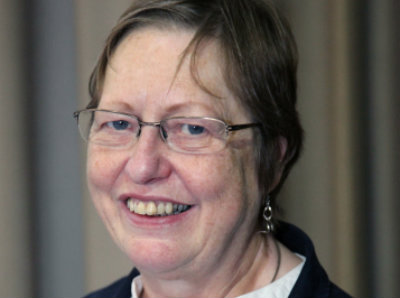
“Social work is a human rights discipline. It’s not just an element of it- it is the core principle.” That is the view of Ruth Stark, the newly appointed president of the International Federation of Social Workers (IFSW) and former head of the Scottish Association of Social Workers.
Social work isn’t always viewed this way though. It is perhaps more often seen as a localised effort to deal with a community’s every day strains and strife than a grand human rights endeavour. But Stark, who still works as a frontline practitioner, feels strongly that social workers need to be able to identify with a global profession in the same way lawyers or health professionals do. They need to understand their work as an important social justice effort rather than having what she calls an “administrative identity”.
The IFSW is an organisation that brings together the representative bodies in social work from 116 countries across the globe and takes the issues from the frontline of social work to the policy makers. With non-governmental organisation (NGO) status in the United Nations, they respond to consultations and work to influence policy.
Stark’s selection as president means the head of the organisation that serves as voice for social work on the global stage is UK-based. But what does being part of a global community mean for social work here?
“Social work is practiced in all sorts of different ways,” Stark explains. “What the IFSW does is not just about representing different countries but about representing different kinds of social work and sharing that knowledge and information.”
She believes that UK social work has “an awful lot to learn from how it is done elsewhere”. Where we are faced with an ageing population, China’s one child policy means their demographic has radically shifted and they have had to be ahead of the curve in tackling the challenge of an increasingly elderly society. The Philippines, faced with huge floods and natural disasters, have developed an expertise in rebuilding communities. Countries who have dealt with post-conflict situations like South Africa and Rwanda have much to teach us too, Stark believes, whilst we could learn a lot from island and other remote communities about how to do social work in rural areas.
“We have to strengthen our links to share this knowledge. We have to sharpen up how the information is exchanged using new technologies,” she says, particularly as a profession that doesn’t have access to the resources law or global health professionals may have to undertake international study visits.
Social work in the UK has already benefited from sharing knowledge internationally. Family group conferencing is now a commonly used technique that was imported from New Zealand where it was developed to help Maori families facing discrimination.
But Stark thinks this sense of global solidarity could be taken even further: “The information we get from social workers at the frontline needs to be taken to the policy makers. It’s about people having the confidence that they can make a difference.”
“Every social worker I have ever known started on this career in order to make a difference in people’s lives. It’s important people recognise that you can be a practitioner and also be involved in leadership at every level, on the frontline as well as at a managerial level.”


 Bournemouth, Christchurch and Poole
Bournemouth, Christchurch and Poole  Hampshire County Council
Hampshire County Council  Lincolnshire County Council
Lincolnshire County Council  Norfolk County Council
Norfolk County Council  Northamptonshire Children’s Trust
Northamptonshire Children’s Trust  South Gloucestershire Council
South Gloucestershire Council  Wiltshire Council
Wiltshire Council  Wokingham Borough Council
Wokingham Borough Council  Children and young people with SEND are ‘valued and prioritised’ in Wiltshire, find inspectors
Children and young people with SEND are ‘valued and prioritised’ in Wiltshire, find inspectors  How specialist refugee teams benefit young people and social workers
How specialist refugee teams benefit young people and social workers  Podcast: returning to social work after becoming a first-time parent
Podcast: returning to social work after becoming a first-time parent  Podcast: would you work for an inadequate-rated service?
Podcast: would you work for an inadequate-rated service?  Family help: one local authority’s experience of the model
Family help: one local authority’s experience of the model  Workforce Insights – showcasing a selection of the sector’s top recruiters
Workforce Insights – showcasing a selection of the sector’s top recruiters 

 Facebook
Facebook X
X LinkedIn
LinkedIn Instagram
Instagram
I am a semi-retired mental health social worker currently working with an organisation [VfMH ] which works in Romania. I have always believed in the importance 0f human rights in social work but have struggled to find any support in my local authority,or elsewhere, for this or for any interest in what happens elsewhere in the social work field outside of the UK..
I was pleased therefore to see your report in Community Care and can only agree with your statement that we need to be able to “identify with a global profession in the same way that lawyers or heath professionals do,”